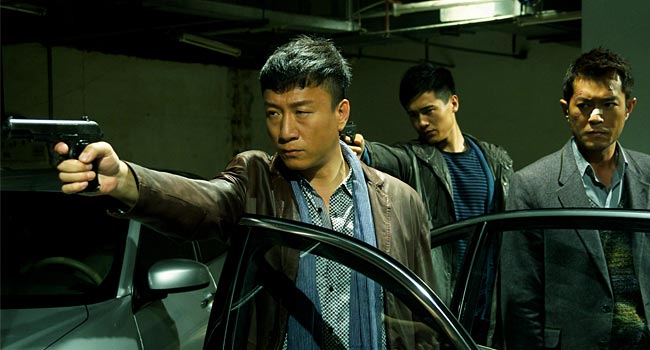
It will be hard to think of another action film topping it in 2013.

It will be hard to think of another action film topping it in 2013.
After a brief journey into romantic comedies and dramas, Johnnie To returns to the genre he knows best with Drug War. To, who has established himself as one of today’s best action directors, continues to solidify his reputation as a master of the genre. Drug War’s intensity comes from the sheer power of its propulsive force. It’s To’s best film in years, and it will be hard to think of another action film topping it in 2013.
In typical fashion with To’s films, the film starts without explaining much. A man is seen driving erratically from an explosion, foaming at the mouth before crashing his car into a restaurant. Nearby, a major drug bust at a toll booth is overrun by Captain Zhang (Sun Honglei). The two seemingly disconnected sequences eventually come together by the end of the first act. The man who crashed his car is Tommy Choi (Louis Koo), a meth manufacturer, and Zhang arrests him while he’s recovering from the crash in a hospital.
At this point Zhang lays everything out for Choi: Making at least 50 grams of meth gets the death penalty in China, and since Choi was running an entire factory there’s no question about what would happen to him. Choi agrees to turn on his business partners in exchange for his life, and starts to lead the cops to his boss. The first half of Drug War, taking place over a day, never stops to take a breath. Every aspect of the film is there to advance the story. As one tense encounter ends, it’s a matter of seconds before we are put in the middle of another one.

One of To’s major talents as a filmmaker is the way he can simultaneously keep the focus on story while establishing strong characters. A lot of this is because of his reliance on actors who have worked with him over the years. Koo, who usually takes the badass role in these kinds of films, takes a surprising turn as the conniving and desperate Choi. Honglei steals the show early on in a sequence where he impersonates two different drug dealers (one deadly serious, the other so jovial he goes by the name Haha) at separate meetings and pulls it off effortlessly. The scene tells almost everything people need to know about Zhang, while delivering as much information as possible to set up the next scene.
And it certainly helps that, in To’s universe, characters are defined by strong and basic motivations. The cops are merely doing their job, and making sure it’s done well, while the drug dealers are simply looking out for their best interests. Choi turns out to be the most unstable character, as a lot of tension is generated by how trustworthy he truly is to Zhang, and that element of ambiguity works especially well here. Different details pop up as well that make Drug War‘s world feel lived in; Two deaf-mute brothers who run a drug factory and the inclusion of characters from a different province’s drug squad serve as nice quirks that increase excitement.
Eventually, as things begin to unravel, the guns start going off in a 15 minute shootout that shows To is at the top of his game. It’s expertly staged, efficiently brutal and heart-pounding in its intensity. To also slides in some commentary on the drug war itself in the midst of all the mayhem, and its effective without being too obvious. Hopefully with Drug War To will return to making action again, as his efficiency in filmmaking works best when he’s within a genre that needs it the most (but it works for almost anything, as his success in romantic comedies have shown). For fans of To Drug War can’t be missed, and for people new to his style it’s an excellent way to get introduced to a truly great director.